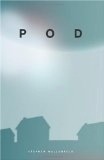 POD
POD
by Stephen Wallenfels
At exactly 5:00am on March 14, the invasion begins. It starts with a horrible screeching noise, then black spheres descend from the sky and vaporize people and cars in the streets with beams of light. After the streets are cleared, the spheres just hang there, mysteriously. Telephones, internet, and all other electronic communications are shut down, and the streets remain a danger zone.
Sixteen-year-old Josh, trapped with his father in their house in Prosser, Washington, calls the spheres Pearls of Death, or PODs for short. Meanwhile, a twelve-year-old girl named Megs is trapped in a hotel parking garage in Los Angeles, when her mother leaves her in the car just before the invasion, promising to return in an hour.
The book alternates between Josh’s and Megs’ stories, as each deals with the aftermath of the invasion. Both are surrounded by people, and yet in some sense alone. Josh’s father obsessively organizes their limited resources, while refusing to allow Josh to talk about his mother, missing and possibly dead in the invasion. Josh can see the people in the apartment building across the street, but with no communications and the streets unsafe, they might as well be on Mars.
Megs spends her time hiding in the garage from the denizens of the hotel; her instincts warn her that she’s safer on her own. When she can, she scavenges food, water, and other resources from the other cars to survive.
POD is science fiction at its best: a gripping post-apocalyptic novel that keeps you on the edge of your seat, yet has human character and human relationships at its heart. One of the fascinating things about post-apocalyptic SF is a chance to look at what can happen to society when life becomes dangerous and resources scarce. The aliens are not the scariest thing in this book; that honor goes to the people who will do anything for food, water, or antibiotics, and the people who use the situation to their own advantage.
POD is a fairly short book, and a quick read. Once you start, you won’t want to put it down. The two stories are a little unbalanced for the first part of the book, in that Megs faces more immediate danger than Josh. Josh's story is more of a relationship story which, while compelling, is slower to develop, and at first I kept wanting to switch back to Megs’ story.
The characters are fascinating and well-developed. Josh's point of view is so well-written that even as an adult and a parent, I sided with Josh in his conflicts with his dad, and felt that his dad was being unreasonable. Megs is a likable, spunky girl who has well-developed survival skills from an unstable pre-invasion home life.
The length of this book might make you wonder if it would be appropriate for middle-grade readers. But this is definitely a YA, not middle-grade book: there are people (and animals) getting vaporized and killed and hurt in horrible ways, and dead bodies bloating after days (weeks) hanging around. Some middle-grade readers may enjoy it, but others might find it too frightening.
POD is the first book in a trilogy, and some questions are left unanswered at the end.
FTC required disclosure: Review copy provided by the publisher to enable me to write this review. The Amazon.com links above are Amazon Associate links, and I earn a very small percentage of any sales made through the links. Neither of these things influenced my review.

